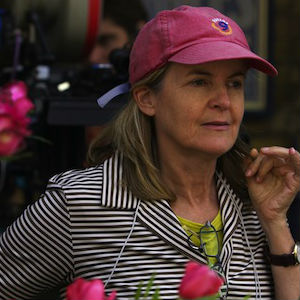
Director Gillian Armstrong has been making award-winning films and documentaries since the seventies including MY BRILLIANT CAREER, OSCAR AND LUCINDA, CHARLOTTE GREY and LITTLE WOMEN.
Gillian was born in Melbourne. She discovered her passion for film at Swinburne Art School, graduating in 1971. After a year in Sydney as an assistant editor, she was one of twelve, along with Phillip Noyce and Chris Noonan, selected for the inaugural year of the AFTRS. Her graduation films SATDEE NIGHT, GRETEL and 100 A DAY won numerous awards and were selected for the Sydney Film Festival and Grenoble International Festival of Short Films in 1974.
Gillian became an integral part of Australia’s new wave of film in the 1970s. In 1975 Gillian directed SMOKES AND LOLLIES, the first in a series of films portraying the coming of age of three Adelaide girls. FOURTEEN’S GOOD, EIGHTEEN’S BETTER, followed in 1980, then BINGO, BRACES AND BRIDESMAIDS (1988), and the award-winning NOT FOURTEEN AGAIN (1996). LOVE, LUST AND LIES is the latest film in the series was released in May 2010. THE SINGER AND THE DANCER starring Ruth Cracknell won the SAMMY Awards for Best Short Film and Best Actress (Ruth Cracknell) and won the Silver Award for Short Fiction at the 1977 Australian Film Awards.
In 1979 Gillian became the first Australian woman in fifty years to direct a feature film. MY BRILLIANT CAREER, starring Judy Davis and Sam Neill, won seven AFI Awards, including Best Director and Best Film, and was selected for the Cannes Film Festival in competition. 1982’s STARSTRUCK, a musical with Jo Kennedy, broke more moulds as one of Australia’s first pop/rock musicals.
In 1984, Armstrong made her first American film, MRS SOFFEL, starring Mel Gibson and Diane Keaton. It was nominated for a Golden Globe for Best Actress and a Golden Berlin Bear in 1985. After 1986’s HBO concert special HARD TO HANDLE on Bob Dylan, Armstrong directed HIGH TIDE, starring Judy Davis and a young Claudia Karvan. It won Best Film at the Houston Film Festival, the Grand Prix at the International de Creteil, and Best Actress (Judy Davis) at the New York Film Critic’s Circle.
THE LAST DAYS OF CHEZ NOUS was nominated for eleven AFI Awards including Best Film and Best Director, and three Film Critics’ Circle of Australia Awards. LITTLE WOMEN followed, garnering three Oscar nominations including Best Actress (Winona Ryder). It has become an American classic, screened annually at Christmas.
OSCAR AND LUCINDA, starring Ralph Fiennes and Cate Blanchett in one of her first screen roles, won five AFI Awards and one Academy Award. In 2001 CHARLOTTE GRAY, starring Cate Blanchett and Billy Crudup, won the 2002 Las Vegas Critic’s Society Award for Best Actress.
In 2006 Gillian directed the acclaimed feature documentary UNFOLDING FLORENCE: THE MANY LIVES OF FLORENCE BROADHURST which was selected for the Sundance, Montreal, Karlovy Vary, Valladolid and Sheffield Film Festivals. The film won an Australian Writers’ Guild Award (Katherine Thomson), Australian Screen Editors Award (Nicholas Beauman) and Australian Cinematography Award (John Radel) and was nominated for three Australian Film Industry (AFI) Awards including Best Documentary.
DEATH DEFYING ACTS, another of Gillian’s features, is the story of Harry Houdini and a Scottish psychic starring Guy Pearce and Catherine Zeta Jones.
Gillian was part of the inaugural ASDA committee and was ASDA’s first president.
In 1993 she received an A.M. for distinguished services to the Australian Film Industry. She as been awarded the Dorothy Azner Directing Award at the Los Angeles Women in Film Crystal Awards, the Chauvel Award from the Brisbane International Film Festival for her contribution to the Australian Film Industry and the Women in Hollywood Icon Award in recognition of her contribution to the film industry. She holds an Honorary Doctorate in Film from Swinburne University and a Doctor of Letters, honoris causa from the University of New South Wales.
As Kevin Thomas of the Los Angeles Times said in his review of LITTLE WOMEN, the film says, “…a great deal about Gillian Armstrong’s own character and integrity as an artist. As she has proceeded from one distinctive accomplishment to the next, alternating between America and her homeland, Armstrong has remained uncompromised…”


